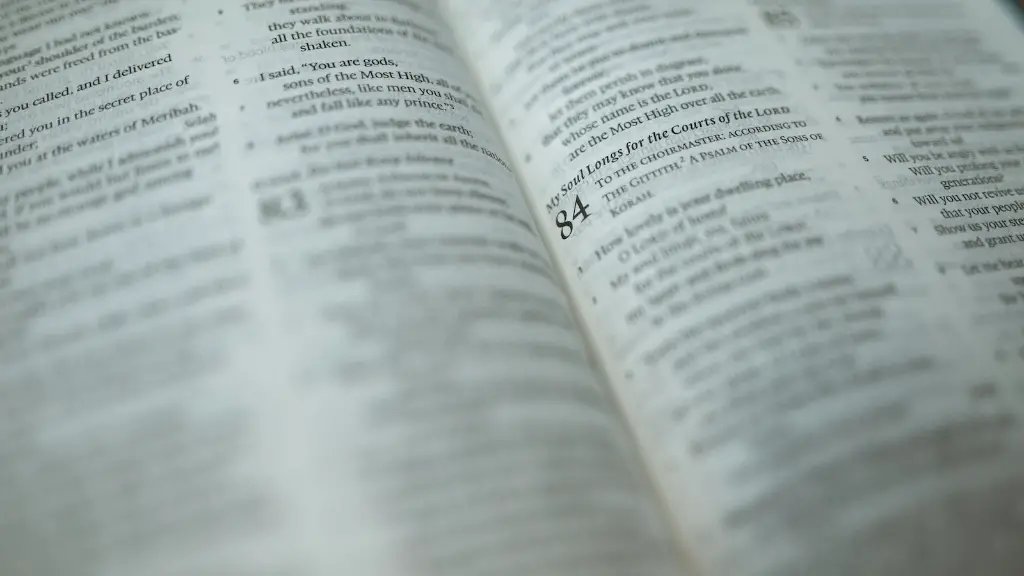The Bible, especially in its more traditional interpretations, has had a reputation for being quite conservative and male-dominated. This has caused much debate in the Christian community, particularly with regards to whether or not women can preach the gospel, teach the Bible, and lead worship services. Though the Bible has never explicitly stated that woman can’t preach, traditional interpretations of passages such as 1 Corinthians 14:34-35 have been used to restrict women to primarily a listening role.
One of the primary questions when considering this issue is whether or not a woman can present the Word and interpret it as a preacher. According to Elizabeth Chapman, an ordained minister and professor at Asbury College, “A woman has the same authority to preach as a man, if God has called her to the task. All of Scripture is open to the interpretation of all people, regardless of gender or age.” She argues that it is important to look closely at the words used in Scripture and to understand the context of each passage, as this can help to provide clarity on the issue.
In 1 Timothy 2:11-12, Paul’s instructions say “Let the woman learn in silence with all subjection. But I suffer not a woman to teach, nor to usurp authority over the man, but to be in silence.” While this passage is often used to support the prohibition of woman from preaching, it has, in fact, been used by some to argue for women’s inclusion in sermons, as the focus here is on learning in silence and not teaching or having authority over men.
Another important thing to note is that, as mentioned above, there are numerous interpretations of these Bible passages, based on the cultural context of the time in which they were written. For example, some scholars, such as Carolyn Custis James, maintain that the Bible actually presents multiple images of female preaching, such as Deborah in Judges 4, Priscilla and Aquila in Acts 18:24-26, and Mary in Luke 1:46-55.
Ultimately, whether or not a woman can preach in the Bible depends on one’s interpretation of the text. For some, the passages used to restrict female preaching must be read in their proper context and in light of new understandings of gender roles within the church. For others, such passages must be read holistically and in light of the many positive examples of female preaching found within the text.
Relation to other Bible passages
Another important matter to consider when discussing the ability for women to preach in the Bible is how this can be related to other passages that speak about the presence and authority of women in Christian ministry.
In Galatians 3:28, for example, Paul writes that in Christ Jesus, “there is neither Jew nor Greek, there is neither bond nor free, there is neither male nor female: for ye are all one in Christ Jesus.” This passage is often seen as a powerful reminder that all believers have equal rights in Christ, regardless of gender.
Ephesians 5:21-33 also presents an important reminder that male and female have different responsibilities, but that the relationship must be mutually honoring. In this passage, Paul admonishes wives to submit to their husbands and husbands to love their wives. This has been used to make the argument that wives must submit to their husbands in all aspects of life, including church leadership roles.
While this verse may be seen to support traditional gender roles, it must be taken in proper context and not used to restrict female preaching and teaching. Rather, it is an important reminder of the importance of mutual love and respect between husband and wife, as is evidenced throughout the Bible.
Cultural context
In addition to the biblical evidence, it is also important to consider the cultural context of the time in which these scriptures were written. In most ancient cultures, women had a much lower status than men and were often excluded from the public sphere. This is an important factor to consider when interpreting the biblical passages restricting women from preaching.
Elizabeth Chapman notes that in ancient times, “it was not common for women to teach in a public setting. In fact, it was not socially acceptable for women to speak in public at all.” However, she does point out that this does not mean that God is opposed to the idea of women preaching, but rather that the cultural context of the time must be taken into consideration when interpreting the Bible.
Furthermore, some scholars point out that women did in fact take on roles as religious leaders, prophetesses, and teachers in the biblical era. Some examples include Miriam, sister of Moses, Huldah a prophetess, and Philip’s four daughters who were all able to prophesy. As such, it may be possible to look at the Bible and its passages in a more positive light, and view them as presenting potential opportunities, rather than restrictions, for women in Christian ministry.
Current context
Lastly, it is important to consider the current context in order to understand how the ability for women to preach in the Bible can have a lasting impact. Today, there are many female Christian leaders and pastors, and as such, the importance of female preachers and teachers should not be overlooked.
In her book, Women of the Word, Jen Wilkin writes: “We can trace the transformation from being kept silent to bring gifted and competent women into the pulpit. Now we are not told that women should remain silent, but that all of those who speak, regardless of gender, must do so in a way that displays the character of Christ.” Wilkin’s argument is that the strength and power of the modern church lies within its diverse membership, with every individual playing a part in the overall mission of God. As such, the ability for women to preach in the Bible should be seen as a sign of an inclusive and diverse faith community.
Additionally, it is worth noting that female preachers and teachers can offer valuable perspectives on the Bible, as they may be able to provide an understanding of the text that is unique and different from that of a male preacher. This is not to say that male preachers are not capable of offering unique perspectives on the Bible, but simply that individuals of different genders have different experiences and understandings of the text that can enhance and deepen the overall Christian experience.
Impact on theological debates
The ability for women to preach in the Bible also has implications for theological debates within the church. For example, some argue that women preachers will help to challenge traditional interpretations of passages such as 1 Corinthians 14:34-35. By looking at the text from a different perspective, preachers can potentially offer new interpretations of these passages, and help to push the church to move beyond traditional gender roles in leadership.
Furthermore, by offering an inclusive space for female preachers, the church can encourage diversity in Christian thought, as well as challenge the notion that only men can interpret scripture and lead in the church. By allowing women to preach in the Bible, the church can strive to create a space in which all voices have the right to be heard.
In conclusion, it is important to recognize the complexity of the issue of whether or not women can preach in the Bible. Biblical scholars have offered various interpretations of the relevant passages, and the cultural context must always be taken into consideration. While the issue is fraught with complexity, it is important to recognize that women’s voices are valuable within the church and that the ability for women to preach in the Bible should not be limited based on gender.
Global perspectives
It is also important to note that the ability for women to preach in the Bible is not limited to just the North American or Western context. In many countries around the world, women are taking on leadership roles in Christian ministry, and the implications of this are far-reaching.
Gift Makau, a pastor and professor at United Theological College of East Africa, notes that in some parts of Africa, the church has embraced a more inclusive approach to ministry and has welcomed women into leadership roles. She emphasizes the importance of female voices in ministry, and the need for more women to take on these roles.
Pariva Tumpa, a pastor in India, further emphasizes the need for female leadership in Christian ministry. She notes how in many countries, women are often denied the right to preach, and she cites the need for more women to take on leadership roles in order to bring about greater change.
The ability for women to preach in the Bible is, thus, a global issue. Though much progress has been made in some parts of the world, there is still a great need for more female leaders to take on roles within the church.
Strength in diversity
Overall, the ability for women to preach in the Bible is important for both theological and cultural reasons. The church must recognize and embrace diversity in order to create a truly inclusive community that is open to different perspectives and ideas.
In a sense, the ability for women to preach in the Bible is not just about gender, but about the value of diversity and understanding within the church. When the church welcomes diverse voices, it can create a space in which all believers are seen, valued, and encouraged to live out their faith in a meaningful way.
Additionally, the church must see female preachers and teachers as important contributors to the overall mission and vision of the church. Rather than viewing them as secondary to their male counterparts, female preachers must be seen as equally valuable and competent.
Thus, the ability for women to preach in the Bible is an important issue that must be taken seriously by the church. If the church truly wishes to create an inclusive and diverse space for all believers, then it must recognize the importance of female voices in Christian ministry, and allow females to fully step into their role as preachers, teachers, and leaders of the church.





